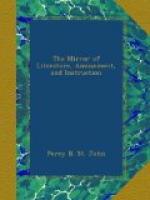And now the heart grows warm,
With feelings undefined,
Throwing their deep diffusive charm
O’er all the realms
of mind.
The loveliness of truth
Flings out its brightest rays,
Clothed in the songs of early youth,
Or joys of other days.
We think of her, the young
The beautiful, the bright;
We hear the music of her tongue,
Breathing its deep delight.
We see again each glance,
Each bright and dazzling beam,
We feel our throbbing hearts still dance,
We live but in a dream.
From darkness, and from woe,
A power like lightning darts;
A glory cometh down to throw
Its shadow o’er our
hearts.
And dimm’d by falling tears,
A spirit seems to rise,
That shows the friend of other years
Is mirror’d in our eyes.
But sorrow, grief, and care,
Had dimm’d his setting
star;
And we think with tears of those that
were,
To smile on those that are.
Yet though the grassy mound
Sits lightly on his head,
We’ll pledge, in solemn silence
round,
THE MEMORY OF THE DEAD!
The sparkling juice now pour,
With fond and liberal hand;
Oh! raise the laughing rim once more,
Here’s to our FATHER
LAND!
Up, every soul that hears,
Hurra! with three times three;
And shout aloud, with deafening cheers,
The “ISLAND OF THE FREE.”
Then fill the wine-cup high,
The sparkling liquor pour;
For we will care and grief defy,
They ne’er shall plague
us more.
And ere the snowy foam
From off the wine departs,
The precious draught shall find a home—
A dwelling in our hearts.
* * * * *
THE SNOW-WHITE VIRGIN.
(From a Winter Rhapsody. By Christopher North. Fytte III.)
There is a charm in the sudden and total disappearance even of the grassy green. All the “old familiar faces” of nature are for awhile out of sight, and out of mind. That white silence shed by heaven over earth carries with it, far and wide, the pure peace of another region—almost another life. No image is there to tell of this restless and noisy world. The cheerfulness of reality kindles up our reverie ere it becomes a dream; and we are glad to feel our whole being complexioned by the passionless repose. If we think at all of human life, it is only of the young, the fair, and the innocent. “Pure as snow” are words then felt to be most holy, as the image of some beautiful and beloved being comes and goes before our eyes—brought from a far distance in this our living world, or from a distance—far, far, farther still—in the world beyond the grave—the image of a virgin growing up sinlessly to womanhood among her parents’ prayers, or of some spiritual creature who expired long ago, and carried with her her native innocence unstained to heaven.




